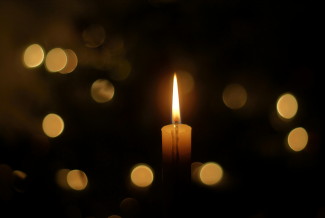Excerpted from How Will We Welcome the Prince of Peace? An Advent Guide for Lectionary Year A from the NC Council of Churches.
Now after they had left, an angel of the Lord appeared to Joseph in a dream and said, “Get up, take the child and his mother, and flee to Egypt, and remain there until I tell you; for Herod is about to search for the child, to destroy him.” Then Joseph got up, took the child and his mother by night, and went to Egypt, and remained there until the death of Herod. This was to fulfill what had been spoken by the Lord through the prophet, “Out of Egypt I have called my son.” When Herod saw that he had been tricked by the wise men, he was infuriated, and he sent and killed all the children in and around Bethlehem who were two years old or under, according to the time that he had learned from the wise men. Then was fulfilled what had been spoken through the prophet Jeremiah: “A voice was heard in Ramah, wailing and loud lamentation, Rachel weeping for her children; she refused to be consoled, because they are no more.” When Herod died, an angel of the Lord suddenly appeared in a dream to Joseph in Egypt and said, “Get up, take the child and his mother, and go to the land of Israel, for those who were seeking the child’s life are dead.” Then Joseph got up, took the child and his mother, and went to the land of Israel. But when he heard that Archelaus was ruling over Judea in place of his father Herod, he was afraid to go there. And after being warned in a dream, he went away to the district of Galilee. There he made his home in a town called Nazareth, so that what had been spoken through the prophets might be fulfilled, “He will be called a Nazarene.”
Matthew 2:13-23 ____________________________________________________________________________________
Today’s reading is not a particularly pleasant text. In the afterglow of Christmas, I read it as a companion text to the post-Christmas blues. The candles have burned out, the relatives have left (that may be a good or bad thing), the presents have been opened, and now it is time to put away the tree. The excitement of a new baby has come and gone, and now reality sets in. In fact, today’s text is actually rather horrific. We read about a jealous Herod trying to end the life and ministry of Christ before it has even begun. Although Jesus’ life is spared, we learn that all of the children in Bethlehem under the age of two are murdered. We have only finished celebrating the birth of baby Jesus and now we are forced to consider his death and resurrection.
The world into which Jesus was born into was likewise horrific. Jesus was born into a world of darkness – a world of murder, violence, suffering, and fear. The Palestine of Jesus’ day was a world of extreme poverty in which wealthy tax collectors benefited from the poor, and those who ruled used extreme forms of punishment, such as crucifixion, to silence any uprisings. Two thousand years later, our world looks very similar as the income gap continues to grow and senseless acts of violence against minorities have given rise to the deepening significance of the Black Lives Matter movement. We still live in a world of deep darkness, although the promises of God to us through the birth of Jesus at Christmas continue to bring us hope for peace. We still live in a world where children and families are forced to flee their homes out of fear for their safety, a world in which “Holy Innocents” are murdered or deported by those “doing their duty,” a world in which parents feel incapable of protecting their children from the terror and fear that is growing around them.
Matthew’s words remind us that Christmas does not stop on that “Silent Night” or “Holy Night” when Christ was born. Because we don’t live in a world of silent, serene nights, we need Emanuel, “God with us,” defenseless child and crucified Messiah. This text reminds us that Christmas isn’t just lights and happy carols about perfect families; rather, many of the stories in the Bibles are about reaching past the margins into chaos, uncertainty, and violence. Christ who comes to be with us is a God who comforts those who mourn, shares our struggles, and dies the most agonizing death enforced by his oppressors. This is our God who “comforts those who mourn, ” claims “peacemakers” as “children of God,” and grants inheritance in the kingdom of heaven to those who “hunger and thirst for justice.” As we look toward a new year in a world plagued with hatred and fear, may this Christmas season allow us to renew our hope in the One who comes to bring a lasting and holy peace.

